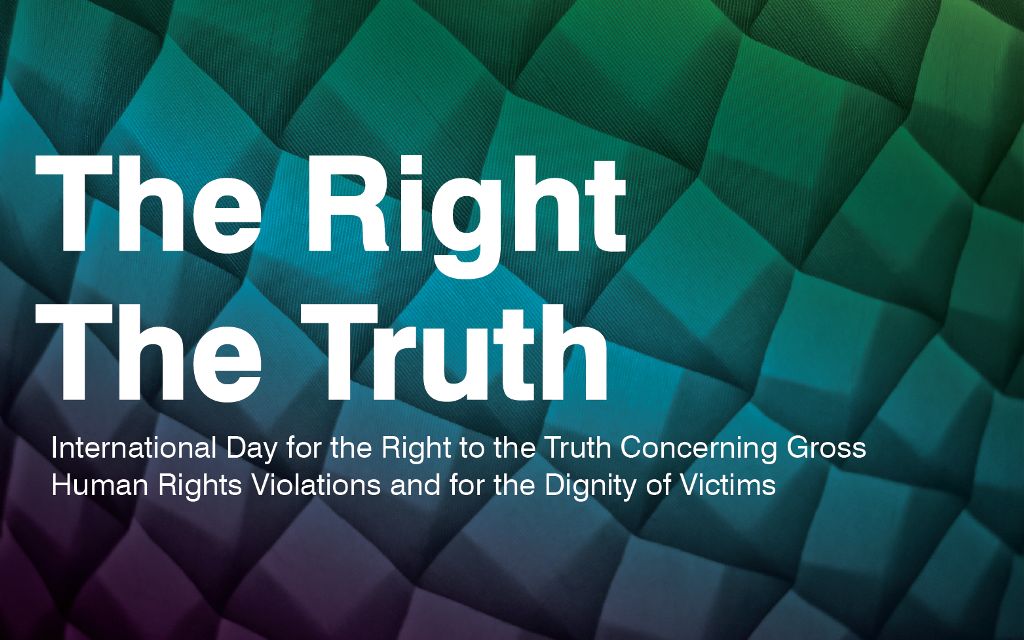The belief in human rights and dignity emphasizes the importance of uncovering severe, and often systemic, violations and abuses. These issues have become a major concern for the international community. Those who have suffered from torture, enforced disappearance, arbitrary arrests, unfair trials, and summary investigations have the right to know the truth about what happened to them. Thisincludes all facts, causes, perpetrators, and the specific circumstances surrounding violations. Truth and reconciliation can only be made possible when the truth is offered without omissions.
Each year, on March 24th, the International Day for the Right to the Truth Concerning Gross Human Rights Violations and for the Dignity of Victims is celebrated worldwide. It is a day to recognize the bravery of victims and their families, as well as the persistence of human rights advocates, who work tirelessly to expose horrific and systematic abuses, seeking justice and reparations for the victims. On this day, we honour the efforts of activists, politicians, media professionals, and human rights defenders who show their commitment to protecting and guaranteeing human rights. This is achieved through conducting effective investigations, ensuring effective solutions, and providing fair compensation to victims.
Human rights violations in Bahrain are still occurring and the truth is continuously concealed. However, the truth cannot remain hidden and there is no legitimate context that justifies the Bahraini authorities’ abuses of human rights and dignity. Most violations in Bahrain have not been investigated by the authorities. The victims of torture, arbitrary arrest, and enforced disappearance, along with their families, are still awaiting justice and they arecontinue to witness the Government of Bahrain fail to overcome a culture of impunity. The fates of Bahraini victims remain in limbo. Many are prisoners of the political crimes, some as mundane as criticizing the government on social media. They have lost their freedom via of unfair trials, based on weak judicial procedures that lack accuracy, independence, or transparency. Additionally, they are victims of investigations that have arbitrarily arrested them, made them the victims of enforced disappearances, and extracted false confessions from them under torture. Any single one of these violations deprives people of their basic rights and robs them of their dignity.
For years, Bahraini authorities have endeavoured to obscure the truth about the deaths of dozens. This includesAli Abdulhadi Mushaima, the first victim of the protests in 2011, who was killed by shotgun pellets, as well as Fadel al-Matrouk, who was shot at close range by security forces during the peaceful funeral march of Ali Mushaima. Despite the formation of a special committee to investigatethese two incidents, the truth of what happened has notbeen officially revealed, and no perpetrators have been held accountable.
Furthermore, on this day, we also remember the businessman and co-founder of the independent newspaper Al Wasat, Abdul Karim Fakhrawi, the blogger Zakaria Al-Ashiri, and all the victims who were tortured to death by security forces inside interrogation rooms. Even when obvious bruises and lacerations were seen on these men, the authorities denied allegations of torture and ill-treatment. Other incidents, such as the death of political prisoner,Abbas Mallah, from medical negligence in prison, have also been obfuscated, with no accountability for prison staff. Impunity prevails in Bahrain, leaving the deceasedprisoners, and their loved ones the victims of phantoms,who can neither expect an explanation nor recompense for what was done to them.
Accordingly, SALAM for Democracy and Human Rights calls on the Bahraini authorities to:
– Fulfil its duty towards protecting and guaranteeing the rights of victims by conducting effective investigations to officially reveal the responsible parties in order to achieve redress and justice.
– Activate the principle of accountability and non-impunity, within the framework of defining the responsibility of the concerned authorities for the implementation of gross violations of human rights during detention, investigation and trial.


 العربية
العربية Français
Français Deutsch
Deutsch